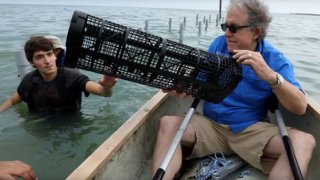
Researchers with the Texas A&M University System say they have created an entirely new and sustainable industry for the Texas coast after artificially spawning oysters in a lab for the first time in 27 years.
The oysters were then placed in a cage and moved to shallow salt water along the Texas Gulf Coast were they are allowed to grow until harvested.
The first instance of caged oyster mariculture in Texas was installed off the coast of Corpus Christi and is a prelude to a growing industry researchers anticipate getting underway in September 2020. That's when tens of thousands of acres of shallow water along the Texas Gulf Coast will be available for commercial oyster aquaculture after a law was passed last year allowing the practice.
"By spawning oysters in the lab from different bays, we can produce seed stock that are ultimately grown out in cages, yielding a consistently attractive and high-quality oyster for you to enjoy at the raw bar," said Dr. Joe Fox, a research scientist with Texas A&M AgriLife Research and HRI Chair of Marine Resource Development at Texas A&M University-Corpus Christi's Harte Research Institute for Gulf of Mexico Studies. "From there on, it's all about the branding."
Fox said the Texas A&M-branded oyster, which they could even create with a maroon color, could be served in seafood restaurants across the Lone Star State.
"What we want to have, make happen here, is that a Texas resident can walk into a Texas restaurant and buy Texas oysters whenever they want," Fox said.
The oysters were successfully spawned by Dr. Hugo Magaña, an AgriLife Research associate research scientist who started with about 200 oysters pulled from Copano Bay that were selected for their appearance.
Texas News
News from around the state of Texas.
"It's presentation. People want an oyster that looks good before they eat it. It could look terrible, have great flavor but no one is going to want to touch it. So here we're producing something that's appealing to the eye and very tasty to the palate," said Magaña.
TAMU said in a news release Wednesday that farming oysters in off-bottom cages allows for their harvest without destroying ecologically valuable oyster reefs.
"One of the problems with oyster farming is in the current reefs that you have right now a dredge may come through, wipe the whole thing out, a hurricane may come through, wipe the whole thing out," Texas A&M Chancellor John Sharp said.
What they have developed, Sharp said, is a sustainable system for beginning the oysters in the lab, moving them to the gulf and then allowing them to grow in a controlled area until they are ready for harvest and then beginning the process again.
"Practical research with real-world impact is the hallmark of The Texas A&M University System," said Sharp. "Dr. Fox's research is creating an entirely new and sustainable industry for the Texas Coast, producing jobs and improving the quality of Texas oysters."
The university added that overfishing, freshwater intrusion and hurricanes - which cover oyster reefs in sand and mud - have reduced traditional oyster harvests off the Texas coast by 43% over the past four years. Meanwhile, oyster aquaculture off the coasts of Florida, Alabama, Louisiana and other states brings more than $200 million each year.
See a video about the oysters here.
The TAMU system said Fox worked with Texas Rep. Todd Hunter (R-Corpus Christi) and Corpus Christi restaurant owner Brad Lomax to introduce House Bill 1300 to make oyster farming legal in Texas - the last state along the Gulf Coast to do so.
Fox's work was funded, in part, by a Chancellor's Research Initiative grant through The Texas A&M University System. Fox and his team are working to develop a breeding program for Texas oysters to improve salinity tolerance, disease resistance and other desirable traits. They will also provide oyster hatchery and farm training for those willing to invest in the new industry.



